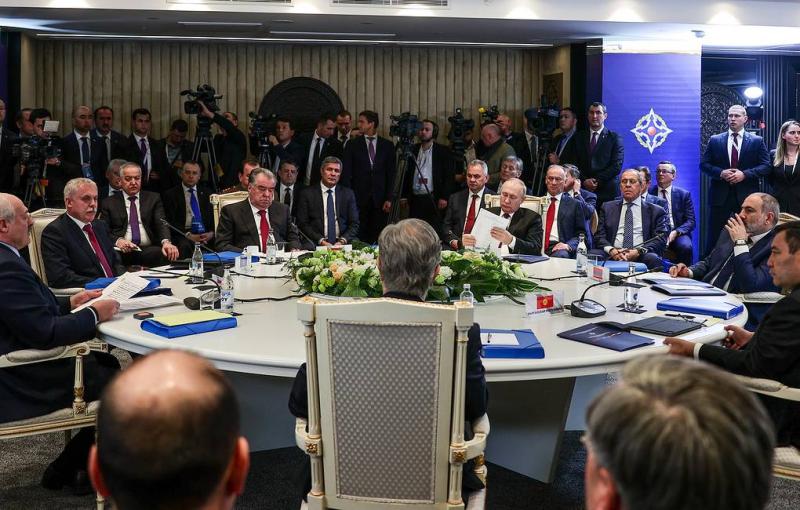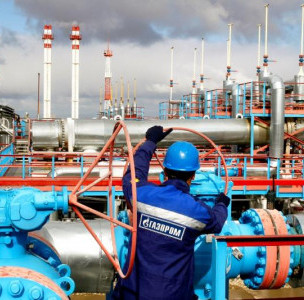
© Vladimir Smirnov/TASS
Top stories from the Russian press on Thursday, November 24th, prepared by TASS
MOSCOW, November 24. /TASS/. The West’s much-talked-about oil price cap is unlikely to be a game-changer for Russia, and the conflict between Armenia and Azerbaijan dominated the CSTO summit. Also, experts expect no legal consequences for Russia from the European Parliament’s decision to designate it as a sponsor of terrorism. These stories topped Thursday’s newspaper headlines across Russia.
Media: Oil price cap unlikely to curb Russia’s share on global energy market
By imposing an oil price cap, the West is seeking to get access to Russian hydrocarbons on equal terms with Asian buyers, rather than curbing Russia’s excess revenues, experts told Izvestia. They say that higher price caps were under discussion. Moreover, the embargo will be eased for a number of European countries and Japan. The decision on the oil price limit was expected back on November 23, but no information about it is available yet. According to the latest data, the United States and its allies have been discussing a limit of $60 to $70 per barrel. However, President Vladimir Putin has warned that Russia will not export its crude to those countries who will agree to the oil price cap.
According to Deputy Director General of the National Energy Institute Alexander Frolov, the Russian oil price ceiling will be set at a level that should be beneficial for Moscow. "Our Western partners have been discussing a higher limit after OPEC+ agreed to cut Russia’s production quota by 500,000 barrels. It turns out that they have been arranging this system so that Russia could benefit from it and we would want to join it," he told Izvestia.
Associate Professor at the Russian Government’s Financial University Valery Andrianov agrees. According to him, attempts are currently being made to adjust the limit to the real selling price of Russian oil in the Asia-Pacific region, which is nearing $70. Given this does not include shipment and insurance costs, the measure will hardly be a game-changer for Russia, the expert told Izvestia. And in this event the oil price cap could even push up Russian oil exports, he insists.
However, the price cap could potentially undermine the regulatory function of OPEC+ and spawn an oligopoly, Yury Stankevich, a member of the State Duma’s Energy Committee told Kommersant. Global oil exports, where OPEC and Russia control almost 70%, are a typical seller’s market, and the expert sees setting an oil price cap as an attempt to strengthen the role of consumers in fixing oil prices. After the West will have tested such a mechanism on Russia, it can use it for other oil producers, including OPEC, Stankevich said.
Maxim Malkov from Kept does not rule out that Russia’s oil production could effectively decline, but it should recover within two to three months, as soon as supply chains are reestablished. Sergey Kondratyev from the Institute for Energy and Finance Foundation finds it unlikely that consumers will refuse to buy Russian crude or reduce their purchases sharply, for they have few alternatives. State-run companies in China and India are highly likely to shoulder the bulk of Russian oil imports in the first two to four months after the price cap, because those are less intimidated by either the sanctions or Russian oil traders, he told Kommersant.
Vedomosti: Conflict between Armenia and Azerbaijan dominates CSTO summit
The recently-concluded summit of the Collective Security Treaty Organization (CSTO) in Yerevan is likely to be continued. Two key documents - the draft resolution by the heads of state on the provision of assistance to Armenia and the final declaration of a meeting of the CSTO Collective Security Council - were submitted for a revision after the leaders discussed them, CSTO chief Stanislav Zas told reporters late on Wednesday. And yet the leaders managed to consider the bulk of issues on their agenda. According to Belarusian President Alexander Lukashenko, 15 out of 17 documents were signed.
The CSTO could decide to deploy a permanent mission to the zone of the conflict between Armenia and Azerbaijan, head of the Caucasus sector at the Russian Institute for Strategic Studies Artur Atayev told Vedomosti. And the organization could arrange its interaction with Baku in such a way so as to establish a mechanism for finding a solution to the long-running conflict. Given the rhetoric by Azerbaijan’s mid-level political elite, Baku is at least not hostile to the CSTO, the expert concluded.
Moreover, Azerbaijan is currently highly interested in reaching a peace deal, since it finds it vital to fix its sovereignty of Nagorno-Karabakh legally, Stanislav Pritchin, a researcher at the Center for Post-Soviet Studies at IMEMO, said.
Pritchin said that Europe and the United States used that interest in an attempt to have a say in the negotiations and outplay Russia as a key mediator. Meanwhile, it is essential for Armenia to delay any potential loss of Karabakh as much as possible, since the issue is very sensitive nationally after the second Karabakh war, Pritchin told Vedomosti. If Nagorno-Karabakh is recognized as part of Azerbaijan, the security of some 100,000 people living there will be critical for Armenia.
Under the 2020 ceasefire deal, an economic base should be created with the opening of transport corridors to help normalize the ties between the two countries. However, no major progress has been made there over the past two years, and the situation there is almost the same as it was before the conflict, Pritchin noted. He doubts the CSTO could currently help settle the conflict, with the majority of its member countries being both friends and partners of Azerbaijan.
Izvestia: What’s behind the European Parliament’s move to brand Russia a ‘state sponsor of terrorism’
On Wednesday, the European Parliament voted to recognize Russia "a state sponsor of terrorism" for its actions in Ukraine. According to the vote, 494 legislators were in favor, 58 opposed it and 44 abstained. The EU’s legislative body remarked in its resolution that, unlike the US, the bloc is lacking a legal framework for designating a third country "a state sponsor of terrorism." All Brussels has is a framework definition of terrorism and a list of terrorist organizations, and the resolution will not have any judicial consequences for Russia.
"This decision cannot have any legal consequences, because the European Parliament does not have any appropriate prerogatives. However, there are political implications, and the resolution may propel this issue legally," Associate Professor of the Department of Integration Processes at MGIMO Alexander Tevdoy-Burmuli told Izvestia. The expert said the EU could later make decisions to facilitate the recognition of a third country as "a sponsor of terrorism".
Director of the Center for European Information, Associate Professor at MGIMO Nikolay Topornin doubts the EU will soon be able to tweak its legislation for that. "This resolution would rather attract the attention of Africa, Asia, the Middle East and other regions," he told Izvestia. And Tevdoy-Burmuli did not rule out that the EP could use this resolution to try and deprive Russia of its say at the United Nations Security Council, even though the procedure of stripping a permanent member of its right to veto is not envisaged in the organization’s documents.
What’s more, the resolution came as no surprise for Moscow. According to First Deputy Chairman of the Federation Council Committee on Foreign Affairs Vladimir Dzhabarov, the European Parliament is no longer playing a decisive role, and all it has been doing of late is inciting enmity between nations. The senator suggested Russia, in its turn, should approve a document recognizing all NATO countries as "sponsors of terrorism" for the massacre of civilians in Yugoslavia, Libya, Iraq and Afghanistan.
Izvestia: Russia finds new tasks for its coastal missile systems
Moscow has set out on reforming the Russian Navy’s coastal missile and artillery troops. Their units are being renamed and will be given a new range of tasks. Specifically, the existing coastal missile and artillery brigades will become coastal missile brigades, Defense Ministry officials told Izvestia. From now on, their main task, apart from coastal protection, will be to support troops both in Russia’s coastal areas and across the country.
Artillery guns have long ceased to be the primary weapon for coastal missile and artillery brigades. And the reform will effectively consolidate the actual state of affairs, military expert Dmitry Boltenkov explains. "The only artillery unit left is the one at a missile and artillery brigade on the Black Sea that has been using Bereg self-propelled coastal artillery guns," he told Izvestia. Of late, brigades have been actively receiving and using Russia’s latest Bal and Bastion coastal defense missile systems. Those are being widely used against ground targets in the special military operation, he noted. According to Boltenkov, Oniks hypersonic and X-35 subsonic missiles are powerful weapons for destroying key targets even behind enemy lines.
And yet artillery guns are still relevant, and coastal troops will not abandon those altogether, the expert assured. Powerful 152 mm Giatsint field guns are still in service with Russian fleets, and they will always be ready to support coastal missile troops if need be, he assured.
The Bal missile system is equipped with X-35U subsonic anti-ship missiles that can hit targets as far as 260 kilometers away. Each self-propelled launcher can carry eight such missiles. And the Bastion system is equipped with Oniks hypersonic missiles. Each launcher carries two such missiles which are extremely difficult to down with ship-based air defenses. There is confirmation that Oniks missiles can be aimed at coastal targets, and a division can use those to control coastlines of up to 600 kilometers long.
Vedomosti: OECD reports drop in European real incomes
In the third quarter of 2022, the Eurozone saw labor costs rise 4% higher than the same period last year, the Organization for Economic Co-operation and Development said in a report in November. According to it, Europeans’ real incomes sank 3.5% on average compared to Q3 2021.
A more than 10% nominal wage increase can be seen in Central and Eastern Europe, according to OECD experts. For them, this indicates that inflationary growth that exceeds target rates is now deeply entrenched.
Inflation has been putting tangible pressure on real incomes in Europe since 2020-2021, when the pandemic was in full swing, said Yelena Kheifets from the Center for Strategic Research. At present, supply chain disruptions amid the food and energy crises as well as the consequences of the anti-Russian sanctions create inflationary conditions in which even measures by European states to compensate for energy consumption cannot stop the decline in real incomes, the expert warned. She expects European incomes to fall below 3.5% amid rising nominal wages.
Alexander Ilyinsky, a research supervisor at the Financial University, forecasts that wages in Europe will go down later this year and in 2023. According to him, inflation has been rising steadily, with the ECB unable to deliver as sharp a rate hike as the Federal Reserve.









